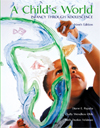Diane E. Papalia,
University of Wisconsin-Madison
Sally Wendkos Olds
Ruth Duskin Feldman
| behavior therapy | therapeutic approach using principles of learning theory to encourage desired behaviors or eliminate undesired ones; also called behavior modification.
|
 |
 |
 |
| bullying | aggression deliberately and persistently directed against a particular target, or victim, typically one who is weak, vulnerable, and defenseless.
|
 |
 |
 |
| childhood depression | mood disorder characterized by such symptoms as a prolonged sense of friendlessness, inability to have fun or concentrate, fatigue, extreme activity or apathy, feelings of worthlessness, weight change, physical complaints, and thoughts of death or suicide.
|
 |
 |
 |
| conduct disorder | repetitive, persistent pattern of aggressive, antisocial behavior violating societal norms or the rights of others.
|
 |
 |
 |
| coregulation | transitional stage in control of behavior in which parents exercise general supervision and children exercise moment-to-moment self-regulation.
|
 |
 |
 |
| drug therapy | administration of drugs to treat emotional disorders.
|
 |
 |
 |
| family therapy | psychological treatment in which a therapist sees the whole family together to analyze patterns of family functioning.
|
 |
 |
 |
| generalized anxiety disorder | anxiety not focused on any single target.
|
 |
 |
 |
| individual psychotherapy | psychological treatment in which a therapist sees a troubled person one-on-one.
|
 |
 |
 |
| industry versus inferiority | Erikson's fourth critical alternative of psychosocial development, in which children must learn the productive skills their culture requires or else face the feelings of inferiority.
|
 |
 |
 |
| obsessive-compulsive disorder | anxiety aroused by repetitive, intrusive thoughts, images, or impulses, often leading to compulsive ritual behaviors.
|
 |
 |
 |
| oppositional defiant disorder (ODD) | pattern of behavior, persisting into middle childhood, marked by negativity, hostility and defiance.
|
 |
 |
 |
| prejudice | unfavorable attitude toward members of certain groups outside one's own, especially racial or ethnic groups.
|
 |
 |
 |
| protective factors | influences that reduce the impact of early stress and tend to predict positive outcomes.
|
 |
 |
 |
| representational systems | in neo-Piagetian terminology, the third stage in development of self-definition, characterized by breadth, balance, and the integration and assessment of various aspects of the self.
|
 |
 |
 |
| resilient children | children who weather adverse circumstances, function well despite challenges or threats, or bounce back from traumatic events.
|
 |
 |
 |
| school phobia | unrealistic fear of going to school, may be a form of separation anxiety disorder or social phobia.
|
 |
 |
 |
| separation anxiety disorder | condition involving excessive, prolonged anxiety concerning separation from home or from people to whom a child is attached.
|
 |
 |
 |
| social phobia | extreme fear and/or avoidance of social situations.
|



 2002 McGraw-Hill Higher Education
2002 McGraw-Hill Higher Education